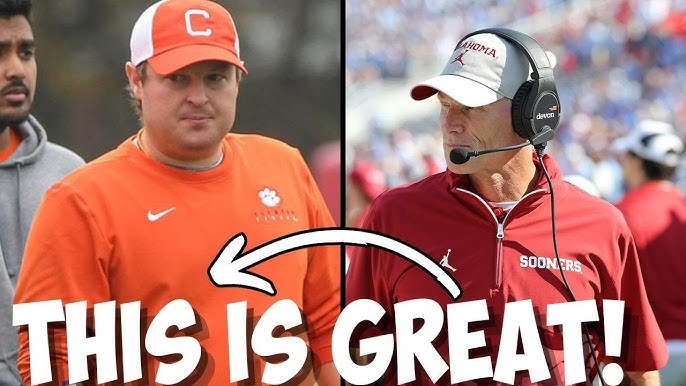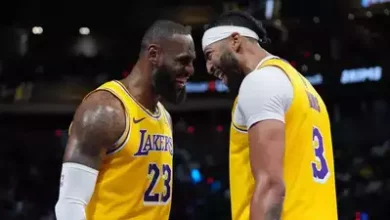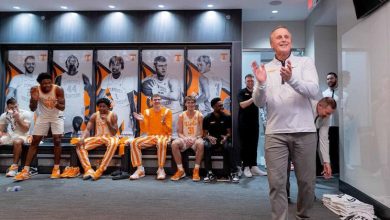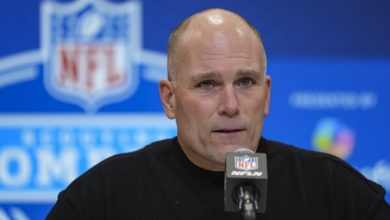Are There Going to Be More Coaching Changes for the Oklahoma Sooners? | OU Football

Are There Going to Be More Coaching Changes for the Oklahoma Sooners? | OU Football
The Oklahoma Sooners football program is no stranger to high expectations. Known for its rich history, numerous conference championships, and Heisman-winning quarterbacks, the Sooners have long been a fixture in college football’s elite. However, as the game evolves and the competition intensifies, Oklahoma has found itself at a crossroads, with questions swirling about potential coaching changes within the program.
In recent years, coaching turnover has become a significant issue for Oklahoma. From the departure of former head coach Lincoln Riley to the shifting of assistant coaching staff, many have wondered if the Sooners are on the cusp of another wave of changes or if their current structure will remain intact heading into the 2025 season.
This article delves into the factors contributing to coaching changes within the Oklahoma Sooners football program, evaluates the current coaching staff’s stability, and explores whether more changes are imminent for the team’s future success. Let’s take a closer look at the broader picture, including recent staff changes, the impact of those decisions, and what might be next for Oklahoma football as they move forward.
The Recent Coaching Changes: The Lincoln Riley Era and Beyond
Oklahoma’s coaching staff has undergone significant changes over the past few years, most notably with the departure of Lincoln Riley after the 2021 season. Riley, who took over as head coach in 2015, led Oklahoma to multiple Big 12 championships and College Football Playoff appearances. Under his leadership, the Sooners became one of the most potent offensive teams in the country, making him one of the hottest names in college football. However, following a surprise move to USC after the 2021 season, the Sooners found themselves in need of a new head coach, which led to the hiring of Brent Venables.
The Arrival of Brent Venables: A New Era Begins
When Venables was hired as the head coach of the Sooners, there was an overwhelming sense of excitement and anticipation. Venables, known for his defensive genius and tenacity, was tasked with restoring Oklahoma’s defensive identity while also maintaining the program’s offensive prowess. Having been part of Clemson’s rise to prominence under Dabo Swinney, Venables was expected to bring a new culture and philosophy to Norman.
However, Venables’ first two seasons at the helm have been a mixed bag. In 2022, Oklahoma finished with a disappointing 6-7 record, marking the program’s first losing season since 1998. While the offensive issues were somewhat expected given the departure of star quarterback Spencer Rattler and the transition to new personnel, the defense under Venables also struggled, which many saw as his area of expertise. The Sooners’ defense, in particular, failed to perform at the elite level that many had hoped for, allowing big plays and failing to consistently stop opposing offenses.
Despite a less-than-ideal start to his tenure, Venables’ passion and commitment to turning the program around were evident. The 2023 season showed signs of improvement, and the Sooners were competitive once again, finishing with an 8-4 record and showing marked improvement in various areas. However, it is clear that Venables still faces significant challenges as he seeks to build a championship-contending team.
Assistant Coaching Changes: The Ripple Effect
While Venables remains the head coach, there have been significant assistant coaching changes as well. Oklahoma’s defensive staff was hit hardest with departures and reshuffling in recent years. After Venables took over, some of the most prominent assistants left or were let go, leading to questions about whether the staff would be able to gel under the new leadership.
The most notable changes occurred on the offensive side of the ball. The departure of Riley meant that the Sooners lost several key figures in their offensive staff, including offensive coordinator Jeff Lebby, who was brought in from Ole Miss. While Lebby’s return to Oklahoma was initially seen as a stabilizing factor for the offense, the team has yet to truly reach the high level of offensive output that it enjoyed under Riley.
One significant departure from Venables’ staff was the exit of Bill Bedenbaugh, Oklahoma’s longtime offensive line coach, who was responsible for shaping some of the best lines in college football over the past decade. Bedenbaugh’s absence was felt, particularly as the Sooners have struggled to maintain consistent offensive line play in recent years. Joe Jon Finley, the tight ends coach, was also brought in as part of the reshuffling, but his ability to maintain the program’s offensive philosophy will be tested going forward.
Despite these challenges, Venables has worked tirelessly to assemble a coaching staff that fits his vision for the team. His commitment to defensive excellence is evident, and he has been very proactive in bringing in staff members who align with his philosophy, even if that means making tough decisions about existing staff.
Potential for More Coaching Changes: What Does the Future Hold?
Looking ahead to the 2025 season, there is plenty of speculation about whether more coaching changes will take place. While Brent Venables has the backing of the administration for now, there is pressure on him to produce results. The Sooners’ fanbase is accustomed to success, and Venables’ hiring was largely met with excitement due to his pedigree. However, the reality of building a competitive program in the SEC, combined with the increasing competition within the Big 12, has made it clear that the Sooners can’t afford another underperforming season.
Here are some factors that could contribute to potential coaching changes in 2025:
1. Performance of the Team in 2025
Oklahoma’s performance in 2025 will ultimately dictate whether more coaching changes are necessary. If the Sooners show continued improvement, particularly on defense, and the offense returns to a high level of production, it’s likely that Venables will have a solid chance to build his legacy. However, if the team regresses or fails to meet expectations, there could be more pressure to make adjustments, particularly in the offensive and defensive coordinator positions.
For instance, Jeff Lebby, the offensive coordinator, could face increased scrutiny if the Sooners continue to struggle offensively. Although he has implemented a more aggressive, up-tempo offensive system, the results have not consistently matched expectations. If Lebby’s offense does not take significant steps forward in 2025, Venables might be forced to make a change.
Additionally, if the defense continues to falter, it’s possible that Venables could look to make adjustments in his own coaching staff. Venables has been known for his defensive acumen, and it is crucial for him to prove that his vision can take shape on the field. If that doesn’t happen, it may lead to a change in defensive personnel or even the defensive coordinator position itself.
2. Recruitment and Talent Development
Recruiting is another key area where changes could be expected. Oklahoma has been a strong recruiter over the years, but as they transition to the SEC, the competition for top recruits will intensify. Venables and his staff will need to prove they can recruit at a high level, especially on the defensive side of the ball.
If Oklahoma is unable to land high-profile recruits or if they fail to develop their current talent into future stars, Venables might find himself under pressure to make changes to his recruiting approach or even his coaching staff. As coaching staffs are evaluated, recruitment remains a key metric for success, and poor results could ultimately lead to turnover within the staff.
3. Pressure from the Administration
Oklahoma’s athletic administration will likely continue to support Venables as long as there are signs of improvement. However, if the team underperforms and shows no clear path forward, the administration might apply more pressure on Venables to make the necessary changes to his coaching staff. The SEC is a tough conference, and as Oklahoma prepares for full membership, they will need to be competitive immediately.
If the Sooners fail to make meaningful strides by 2025, the administration may view additional coaching changes as necessary to maintain the program’s national relevance.
4. Potential Assistant Coaching Hires
As Venables continues to develop his program, the possibility remains that he will make assistant coaching hires to address specific weaknesses or bring in fresh perspectives. Historically, the Sooners have benefited from bringing in new ideas and coaching talent, and Venables may look to make changes to his staff in 2025 to enhance the overall product.
It’s possible that Venables might look to bring in a more experienced offensive mind or a proven defensive coordinator to take charge of specific areas of the game. Oklahoma’s offense has the potential to be explosive, but they need a more stable and consistent approach to complement the talent they have. Changes in staff, particularly on the offensive side of the ball, could be in the cards if Venables feels it will provide the team with the best opportunity to succeed.









